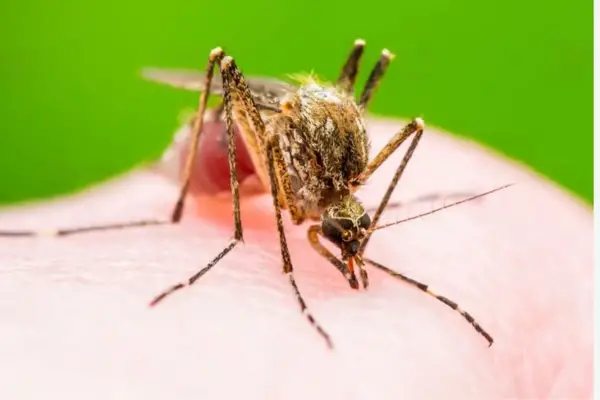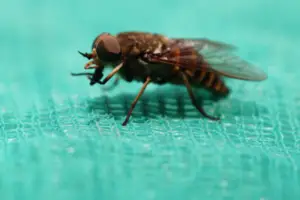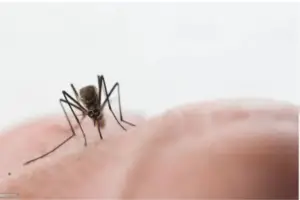Curious about how long mosquitoes live? Maybe you’re wondering about the lifespan of that mosquito you saw flying around your living room last night. Will it just die on its own if you ignore it?
Many people ask about the lifespan of mosquitoes, especially during the peak of mosquito season in the summer. At MosquitoVibe, we frequently receive this question.
Today, we’ll provide a detailed explanation of the entire mosquito life cycle and address common questions related to mosquito control. Be sure to read until the end to get all the important information you need.
The Overview of Mosquitoes Explained
Mosquitoes (scientifically known as Order Diptera, Family Culicidae) are incredibly adaptable and successful insects, thriving in various environments.
They can be found in surprising locations, from deep mines to mountain peaks, and even in our own backyards.
While not all mosquito species cause problems for humans, many have harmful effects.
You can identify mosquitoes by their long, piercing proboscis and the scales on their wing veins.
In the United States alone, there are about 176 mosquito species, and there are over 3,000 species worldwide.
Some mosquitoes carry diseases, while others are annoying and disrupt our daily lives.
Understanding the Mosquito Life Cycle
Mosquitoes require standing water to reproduce, but different species inhabit different habitats. Some prefer temporary water sources, while others thrive in water that remains for long periods.
Some species are so specialized that they lay eggs only in natural or artificial containers.
Despite their habitat preferences, all mosquitoes go through a four-stage life cycle:
- Egg
- Larva
- Pupa
- Adult.
The larval and pupal stages are always spent in water.
Related Post: Do Hummingbirds Eat Mosquitoes? Answered
Life Stages of Mosquitoes LifeSpan Explained
Mosquito Eggs
- Female adult mosquitoes lay their eggs on the inner walls of containers with water, above the waterline.
- Usually, mosquitoes lay around 100 eggs at once.
- These eggs are tough and stick to the container walls like glue, surviving even up to 8 months without water, including the winter in the southern United States.
- A small amount of water is enough to attract a female mosquito, and they can use various containers like bowls, cups, fountains, tires, barrels, and vases as a “nursery.”
Female mosquitoes lay their eggs in different ways, depending on the species. Some lay them individually, while others lay them in groups called rafts.
They place the eggs on still water surfaces, along the edges of water bodies, in treeholes, or in areas prone to flooding from rain or irrigation.
The time it takes for the eggs to hatch varies, with temperature playing a significant role.
Some eggs may hatch within a few days, but if laid out of water and subject to intermittent flooding, they can remain dormant for several years until the right hatching conditions occur.
Mosquitoes can spend the winter as eggs, larvae, or adults, depending on the species.
The Larval Stage
- Larvae hatch from mosquito eggs when the water level rises to cover them. This can happen due to rainwater or when humans add water to the containers.
- Larvae feed on microorganisms present in the water and go through three molting stages before transforming into pupae.
Once the egg hatches, the larval stage begins. Most mosquito larvae hang suspended from the water’s surface to breathe air through a tube called a siphon.
They feed on tiny aquatic organisms near the water’s surface. When threatened, larvae can quickly dive deeper by swimming in an “S” motion, earning them the names “wigglers” or “wrigglers.”
As they grow, they shed their outer covering multiple times in a process called molting. The stages between these molts are called instars.
The length of the larval stage can range from 4 to 14 days, depending on species, water temperature, and food availability.
The Pupal Stage
- The larvae transform into pupae, where they develop until the newly formed adult mosquito emerges from the pupal skin and leaves the water.
During the pupal stage, mosquitoes do not feed, but they still need to breathe air at the water’s surface.
Pupae are sensitive to light and disturbances and are physically active, using a tumbling action to move to deeper water, earning them the nickname “tumblers.” This stage lasts from 1 1/2 to 4 days.
When ready, the pupa’s skin splits, allowing the adult mosquito to emerge and rest on the water’s surface.
Adult Mosquitoes
- Once adult mosquitoes emerge, male mosquitoes feed on nectar from flowers, while female mosquitoes feed on humans and animals to get blood for egg production.
- After feeding, female mosquitoes search for water sources to lay more eggs.
- Aedes aegypti mosquitoes typically fly short distances, limited to a few blocks throughout their lives.
- Unlike other mosquito species, Aedes aegypti mosquitoes prefer to bite people and are often found living near human habitats, such as inside homes, buildings, and businesses that lack window and door screens or have doors left open.
Male adult mosquitoes emerge first and wait near breeding sites for the females. Mating occurs quickly due to high adult mortality rates, with up to 30% of the adult population dying each day.
Females compensate for this by laying a large number of eggs to ensure the species’ survival. Male mosquitoes live for about 6 or 7 days, primarily feeding on plant nectar and not taking blood meals.
Females, on the other hand, can live up to 5 months or longer if they have enough food. They require a blood meal to nourish and develop their eggs.
Female mosquitoes locate their victims by sensing carbon dioxide, amino acids, and other chemicals exhaled by the host, as well as the host’s temperature patterns.
They have a remarkable sensitivity to these chemicals. The average flight range for female mosquitoes is between 1 and 10 miles, but some species can travel up to 40 miles before taking a blood meal.
After each blood meal, the female lays her eggs, completing the life cycle. While some species oviposit only once, others may lay eggs multiple times throughout their lives.
How Long Do Mosquitoes Live?
Adult female mosquitoes, responsible for biting and transmitting diseases, can live up to 5 months or longer, with an average lifespan of about 6 weeks. In contrast, male mosquitoes typically live only 6 or 7 days on average and do not take blood meals.
The mosquito life cycle consists of four stages: egg, larva, pupa, and adult, with the larval and pupal stages being aquatic.
Mosquitoes need standing water to reproduce, and their breeding habitats vary depending on the species, ranging from temporary water sources to permanent water bodies or natural/artificial containers.
How To Protect Yourself From Mosquitoes
We play a role in determining how long mosquitoes live by protecting ourselves from their bites. Without our blood, mosquitoes cannot survive.
If you are going outside on a day with many mosquitoes or visiting a place with a lot of mosquitoes,
Here are some easy tips to protect yourself:
- Remove stagnant water, like in pool covers or clogged rain gutters, where mosquito eggs can grow into full insects.
- Wear clothing that covers your skin, such as long-sleeve shirts and pants, or consider getting mosquito-repellent clothing.
- Use mosquito repellent to keep them away.
- Plant mosquito-repellent plants in your garden and outdoor areas.
- If you see a lot of mosquitoes outside, it’s better to stay indoors to avoid their bites.
Even when we take precautions, mosquito bites might still happen. But no worries! There are ways to ease the itch from a mosquito bite, like using the Bug Bite Thing for relief.
FAQ
How Long Do Mosquitoes Live Indoors?
Wondering how long mosquitoes survive indoors after flying in through an open window? Mosquitoes that reach adulthood indoors can live for about a month, which is longer than those living outdoors for an average of 2 to 3 weeks.
This is because indoor environments lack the natural predators that would usually prey on them. In your home, mosquitoes find plenty of resting places, like under sinks or in closets, garages, and laundry rooms.
Moreover, they have access to food and water sources, such as houseplants, kitchens, bathrooms, and garages. If a female mosquito drinks blood, it can lay up to 300 eggs in one go, making the situation even more challenging.
How Long Do Mosquitoes Live Without Blood?
Worried about an infestation while you’re away on vacation? Starving mosquitoes won’t solve the problem. Even without blood, mosquitoes typically survive for approximately 2 to 3 weeks, or even longer in favorable conditions.
Contrary to popular belief, mosquitoes don’t actually feed on blood for survival. Only female mosquitoes bite humans to obtain blood, which is necessary for laying eggs.
However, they can use blood from other vertebrates like cats and dogs as well. Mosquito larvae feed on algae, bacteria, and organic matter in water, while adult mosquitoes get their nourishment from sugar found in nectar, fruit juice, and plant sap.
Cutting off their blood supply won’t make them starve, but it might slow down their reproductive cycle.
Related Post: Debunking The “Mosquito Eater” Misconception
How Long Do Mosquito Eggs Take to Hatch?
Though household mosquito sprays can kill adult mosquitoes, your mosquito problem might persist if they are actively breeding around your property.
Female mosquitoes lay up to 300 eggs in each batch, and these eggs take about 8 to 10 days to hatch and become adults.
Breeding behaviors may differ depending on the mosquito species, with many, like the common house mosquito, laying eggs in stagnant water.
Reducing their population involves eliminating or regularly cleaning and replacing sources of standing water.
Additionally, using mosquito dunks or larvicides can help control mosquitoes outdoors.
How Long Does A Mosquito Live After It Bites Someone?
Only female mosquitoes bite because they need blood to lay eggs. Some people think that mosquitoes die soon after they bite, but that’s not true, as per the Mosquito Squad.
Female mosquitoes have the ability to keep feeding on blood continuously, so they can bite multiple times and survive after biting someone. As long as they are flying around, they can bite unless they are crushed.
References
- EPA: “Mosquito Life Cycle”
- American Mosquito Control Association: “FAQ”





